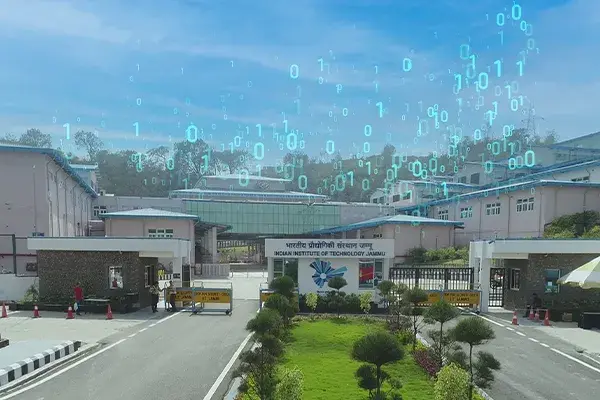IIT Jammu Post Graduate Diploma in Cyber Security – Batch 02

About Course
With the increasing reliance on digital technologies across various sectors, there
is a growing demand for professionals who can effectively safeguard sensitive
information and systems from cyber threats. The Post Graduate Diploma in
Cyber Security from IIT Jammu is a comprehensive programme designed to
equip learners with the knowledge, skills, and expertise required to address the
complex challenges of cyber security in today’s digital world.
Get ready for an interactive journey where you’ll explore various symmetric and
asymmetric cipher schemes through practical assignments and gain invaluable
experience in applying these concepts in the real world.
IIT Jammu PGD in Cyber Security – Batch 02_Brochure
IIT Jammu Post Graduate Diploma in Cyber Security – Batch 02
What Will You Learn?
- Understand essential cyber security fundamentals, terms, and technologies
- Comprehend CIA principles, cyber kill chain, threats, attacks, vulnerabilities, and security principles
- Explore Confidentiality, Integrity, and Availability across Network Security Models, System Security Models, and Frameworks
- Develop skills to detect and investigate data breaches and cyber attacks
Course Content
Semester 1
Module 1: Mathematical Foundations and Cryptography
Learning Outcomes:
1. Understand the mathematical concepts of number theory, abstract algebra, linear algebra, and probability.
2. Get a thorough understanding of various symmetric and asymmetric cipher schemes and a hands-on experience of applying them in the real world through practical assignments.
3. Understand the fundamental mathematical concepts of cryptography and will be able to implement and understand the commonly used symmetric and asymmetric cryptography schemes such as AES, DES, DH and EC and hashing schemes such as MD5, SHA256 etc.
4. Applied cryptography will help the learner develop new solutions that either test cryptographic protocols and their strength and architecture better confidentiality and integrity approaches and solutions.
-
Divisibility, Modular Arithmetic, Algorithms for Integer Operations
-
Prime Numbers, Congruence, Solving Congruences, Fermat’s Little Theorem
-
Sets, Relations and Mapping, Closure property, Monoied, Group
-
Rings and Fields, Operations on Finite Field, Polynomials over Finite Field
-
Random Variable and Sample Space, Expectation and Variance
-
Classical Encryption Scheme and their Cryptanalysis: Shift Cipher
-
Block Ciphers and Stream Ciphers: Substitution Permutation Networks, Linear Cryptanalysis
-
Asymmetric Cryptography: RSA, Diffie Hellman, Elliptic Curve
-
Hash Function, Message Authentication, and Digital Signature schemes
Module 2: Computer Networking
Learning Outcomes:
1. The learner will be able to set up a network, perform subnetting, configure switches and routers, and will be able to perform passing sniffing on TCP/IP networks.
2. The learner will be able to perform network programming. Learners will be able to configure VLAN and Wireless systems.
3. The learners will be able to learn IOT Architecture, SDN and NFV concepts and apply them.
-
History of Computer Networking, Packet and Circuit Switching, Delays, Protocol Layers
-
Application Layer, Network Application Architecture, Web and HTTP, FTP, SMTP, DNS
-
Transport Layer, Multiplexing and Demultiplexing, UDP, Reliable Data Delivery Principles, TCP
-
Network Layer, Virtual Circuit and Datagram Networks, IP, Routing and Forwarding, Router
-
Link Layer, Error Detection and Correction, Multiple Access Control, Ethernet 802
-
Switching, Switches, VLANs
-
Wireless Links, 802.11 Architecture and Protocols, Bluetooth and Zigbe
-
Physical Layer – Wireless Propagation and Performance Analysis
-
Practical: Wireshark and Packet Sniffing, Writing a Packet Sniffer in C and Python
-
Practical: Socket Programming in C
-
Practical: Networking Commands in Windows and Linux Environment
-
Practical: Setting up Networks, CISCO Packet Tracer, Switch, and Router Configurations
-
Practical: Setting up Web Servers, DNS, SMTP, POP, and IMAP and hands-on over other Application Layer Protocols
-
Practical: Understanding of Physical Layer and WIFI Communication Using SDR
Operating Systems Fundamental
1. This course on operating systems will give a deep and fundamental understanding of the variety of operating systems we use and how the operating systems work and provide a bridge between the software we see and the hardware we rely on. The objective of the course is to let the candidate understand the concepts of process, memory management, storage management, CPU scheduling, etc. for an overall understanding of the system's domain.
2. The course will help understand the program in execution and how call stacks function and the memory is managed. Details of security-specific implementations and policies will make the learner understand the ecosystem of defense in depth in the OS environment.
-
Introduction to Operating Systems: OS Evolution, Services, System Calls, Operating System Structure and Architecture, System Programme, OS Booting
-
Process Concepts and Scheduling, Inter-process Communication, Threads, and Multithreading Concepts
-
CPU Scheduling, Scheduling Algorithms, Multiprocessor Scheduling, Process Synchronization, Monitors, Semaphores, Deadlocks
-
Memory Management: Paging, Memory Allocation, Swapping, Virtual Memory, Thrashing
-
Storage Management: File Concepts, Directory Concepts, Allocation Methods, Free Space Management, Disk Management, and Scheduling
-
Access Control and Authentication, Memory Protection Concepts, Programme Threats, Malware Analysis
-
Practical: Basic Unix, Linux Administration and Commands
-
Practical: Linux System Calls and Understanding, Shell Programming
-
Practical: CPU Scheduling Algorithms, IPC Using Shared Memory, Deadlock Avoidance and Detection Algorithms, Semaphores
-
Practical: Multi-threading and Synchronization, Paging Algorithms, File Allocation
Module 4: Introduction to Cyber Security
The learner will be able to understand a specific topic of study chosen for a technical seminar in a greater depth and will be able to generate knowledge through a systematic process. The candidate will learn technical report writing, knowledge generation, and technical presentation skills. The candidates will submit the technical studies performed during the course as survey papers in Journals and/or conferences or host them as knowledge for others.
-
Introduction to Cyber Security- What is Cyber Security, Cyber Threats, CIA Principles, OSI Security Architecture
-
Cyber Kill Chain/Hacking methodologies, MITRE Attack Framework
-
Multilevel Security Models: Bell LaPadula Model and Biba Model
-
Security Design Concepts: Principle of Least Privilege, Defense in Depth, Compartmentalization
-
Cyber Attacks Case Study and Discussions, Cyber Security Resources and References
Module 5: Technical Seminar
The learner will be able to understand a specific topic of study chosen for a technical seminar in a greater depth and will be able to generate knowledge through a systematic process. The candidate will learn technical report writing, knowledge generation, and technical presentation skills. The candidates will submit the technical studies performed during the course as survey papers in Journals and/or conferences or host them as knowledge for others.
-
Identify and choose issues of practical importance in the area of security
-
Learn how to get systematic literature on a technical subject and perform critical thinking, aims and motivation
-
Learn components of a good technical presentation/report, soft skills
-
Learn comparative analysis, how to identify gaps, practical implementation, verification and validation of technical content
-
Final presentation, feedbacks and discussion
Semester 2
Module 1: Web Application and Network Security
The candidates will be able to perform basic network and web application penetration testing and will be able to develop new tools from the knowledge made available through network programming exercises that can do packet crafting and sniffing and scanning activities.
-
Introduction to Web Application Security: OWASP security risks, XSS, CSRF, SSRF Attacks and Countermeasures
-
Symmetric Key Distribution Techniques, Public Key Infrastructure and Applications, HTTPS, TLS, X.509
-
DNS and Email Security: Cache Poisoning, Reflection, Tunneling, Spoofing, DNSSEC
-
Attacks on Transport Layer, Network Layer and Data Link Layer and their countermeasures, Network Programming Concepts
-
Intrusion Detection Systems, Firewalls, Proxies, Caches, Honeypots, Case Studies
-
Practical: Web Application Penetration Testing and Hands On Exercises, Openssl and PKI Realisation
-
Practical: Packet Crafting via Popular Tools and Through Raw Socket Programming to realise network attacks
-
Practical: Email and DNS Security, ICMP and ARP based Attacks, Phishing
-
Introduction to Popular Packet Filtering Firewall, Intrusion Detection Systems, Web Application Firewalls
Module 2: Multimedia and Digital Forensics
After completion of this course, students will be able to understand: An overview of the major problems and recent developments in the field of multimedia security & forensics. Effective forensic tools to authenticate digital media and detect tampering operations, will be able to do mobile and disk forensics.
-
Fundamentals of Digital Forensics
-
Multimedia Forensics, Format Based Forensics, Pixel-based Forensics, Statistical Based Forensics, Camera Based Forensics, Homomorphic Encryption
-
Framework for Digital Forensics Evidence Collection and Processing, Incident Response
-
Disk and Mobile Forensic techniques, Mobile Device Security Analysis, Incident Response
Module 3: Systems and Software Security
After the end of the course, the learner will be able to get a detailed understanding of attacks on operating systems security and counter measures that should be taken care of while designing an operating system or configuring an existing one. The learner will understand secure software development, threat modelling, software code flow analysis and best programming practices to avoid well known flaws.
-
Fundamentals of Linux and Windows OS
-
Programme Binary Formats, Libraries Linkers and Loaders, Process Layout, Stack Layout, Heap Layout and Customisation
-
Programming Language Weakness, Stack Smashing Heap Spray, Return Oriented Programming
-
Principles of Defences, Address Space Randomization, Stack Canaries, Data Execution Prevention
-
Vulnerability Analysis and Standardization, Scanners, Binary Diffing, Malwares and Analysis
-
Reverse Engineering, Use Cases and Examples
-
Software Security Issues and Best Practices
Module 4: Special Topics in Cyber Security
After completion of this course, the learner will be able to understand attacks in the multi-tenancy architectures and configure security measures and defences in cloud environments, VMs, develop multi-factor authentication schemes, understand and apply side channel attacks.
-
OWASP Cloud Security Risks, Virtualization and related setbacks, Co Residency Attacks and Countermeasures
-
Hyperjacking, Rootkits, Hypervisor Vulnerabilities, XEN, KVM and Related Case Studies, Defenses in Azure, AWS, Data Security
-
IoT and SDN Security Issues and Challenges
-
Machine Learning for Security- Application of Machine Learning in Solving Various Problems in The Domain of Security, Deep Fake Detection
-
Data Security and Privacy issues; Frameworks and Standards, Cyber Security Laws
Module 5: Applied Cyber Security Project
After completion of this course, it is expected that the learner will be able to take up bigger cyber security projects along the same lines in the industry. Learner will be able to prototype at least one usable and novel cyber security solution from his learnings of PGDCS.
-
Problem Statement Discussion and Literature Survey
-
Research Gaps Identification, Architecture The Solution
-
Experimentations and Analysis
-
Article or Publication Writing and Demonstrations
Tools
-
Wireshark
-
TCPDUMP
-
BurpSuite
-
Zed Attack Proxy
-
BwApp
-
Nmap
-
hPing
-
Hashcat
-
Volatility
-
FTK Imager
-
IPTables Firewall
-
ProcDump
Assignments/Case-studies/Projects
-
Design and Development of Intrusion Detection Systems
-
Develop Security Related Protocols for Low Powered Device
-
Design and Development of Intrusion Prevention Systems and Honeypots
-
Develop Email Security and Anti Phishing SolutionsDigital Forensics Solutions
-
AI powered Cyber Offense/Defense
-
Homomorphic Encryption Applications
-
Design and Develop IAM solutions for Infrastructure
-
Develop Security solutions for Hypervisor and Virtualized Resources in CloudVPNS and Proxy Development
-
PKI and Applications Development
